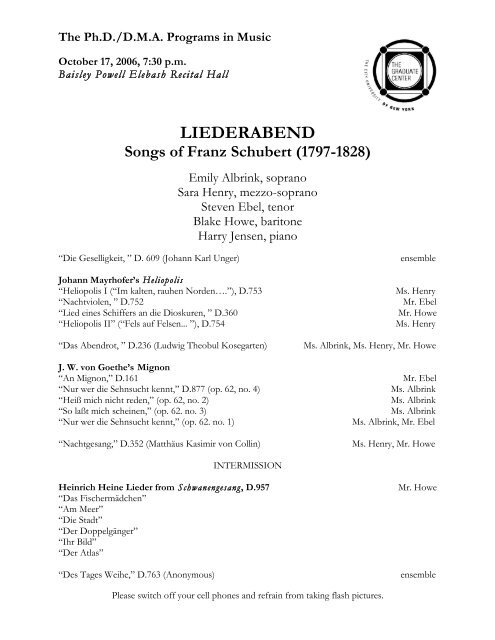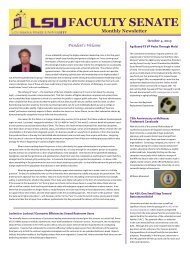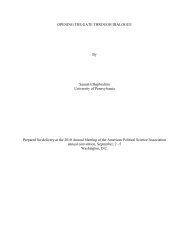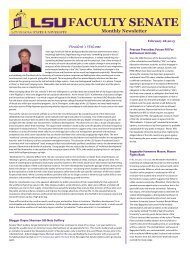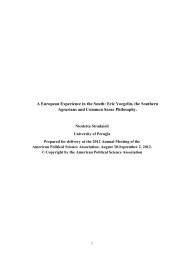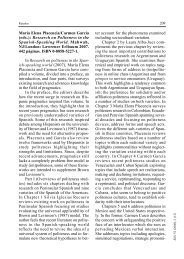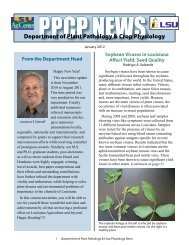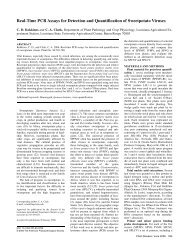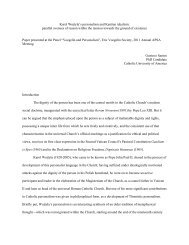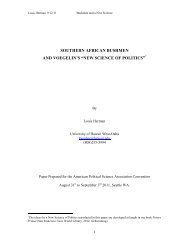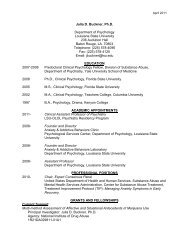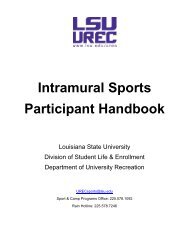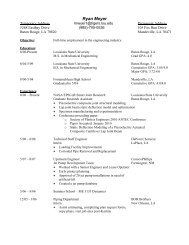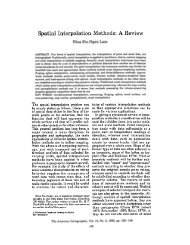LIEDERABEND
LIEDERABEND
LIEDERABEND
Create successful ePaper yourself
Turn your PDF publications into a flip-book with our unique Google optimized e-Paper software.
The Ph.D./D.M.A. Programs in Music<br />
October 17, 2006, 7:30 p.m.<br />
Baisley Powell Elebash Recital Hall<br />
<strong>LIEDERABEND</strong><br />
Songs of Franz Schubert (1797-1828)<br />
Emily Albrink, soprano<br />
Sara Henry, mezzo-soprano<br />
Steven Ebel, tenor<br />
Blake Howe, baritone<br />
Harry Jensen, piano<br />
“Die Geselligkeit, ” D. 609 (Johann Karl Unger)<br />
Johann Mayrhofer’s Heliopolis<br />
“Heliopolis I (“Im kalten, rauhen Norden….”), D.753<br />
“Nachtviolen, ” D.752<br />
“Lied eines Schiffers an die Dioskuren, ” D.360<br />
“Heliopolis II” (“Fels auf Felsen... ”), D.754<br />
“Das Abendrot, ” D.236 (Ludwig Theobul Kosegarten)<br />
J. W. von Goethe’s Mignon<br />
“An Mignon,” D.161<br />
“Nur wer die Sehnsucht kennt,” D.877 (op. 62, no. 4)<br />
“Heiß mich nicht reden,” (op. 62, no. 2)<br />
“So laßt mich scheinen,” (op. 62. no. 3)<br />
“Nur wer die Sehnsucht kennt,” (op. 62. no. 1)<br />
“Nachtgesang,” D.352 (Matthäus Kasimir von Collin)<br />
ensemble<br />
Ms. Henry<br />
Mr. Ebel<br />
Mr. Howe<br />
Ms. Henry<br />
Ms. Albrink, Ms. Henry, Mr. Howe<br />
Mr. Ebel<br />
Ms. Albrink<br />
Ms. Albrink<br />
Ms. Albrink<br />
Ms. Albrink, Mr. Ebel<br />
Ms. Henry, Mr. Howe<br />
INTERMISSION<br />
Heinrich Heine Lieder from Schwanengesang, D.957<br />
“Das Fischermädchen”<br />
“Am Meer”<br />
“Die Stadt”<br />
“Der Doppelgänger”<br />
“Ihr Bild”<br />
“Der Atlas”<br />
“Des Tages Weihe,” D.763 (Anonymous)<br />
Mr. Howe<br />
ensemble<br />
Please switch off your cell phones and refrain from taking flash pictures.
Notes on Three Poets<br />
Johann Mayrhofer (1787–1836) shared a Viennese apartment with Schubert for two years, from 1818–20. A depressed individual,<br />
Mayrhofer led a double-life as a poet and as a censor for the oppressive Metternich regime—an occupation which surely rankled his fellow<br />
liberal intellectuals. He ended his own life by throwing himself out the window of the censorship office where we was employed. While the<br />
artistic relationship between Mayrhofer and Schubert proved productive—the composer set nearly fifty of the poet’s works to music, more<br />
than any other poet save Goethe—the status of their personal relationship is full of mystery. They may have been involved romantically<br />
while they lived together, but what caused their relationship to end is unknown (there are no known points of contact between the two<br />
after 1820).<br />
Mayrhofer’s cycle of twenty poems, entitled Heliopolis, is less a narrative cycle and more a philosophic one, exploring the relationships<br />
between art and nature. Heliopolis—the Greek land of the Sun—represented an idyllic artistic paradise to Mayrhofer, free from worldly<br />
torment. Schubert set four poems from this poetic cycle in 1822, perhaps as a farewell to his alienated colleague. It is fascinating to<br />
wonder whether Schubert intended to set only these four poems, or whether he had planned to set the whole cycle before abandoning the<br />
project.<br />
J. W. von Goethe (1749–1832), one of the greatest figures in German literature, created the character of Mignon for his didactic novel<br />
Wilhelm Meister’s Apprenticeship (1795). Mignon is a sexually indistinct child of incest, kidnapped from foster parents into an abusive<br />
traveling circus troupe until Wilhelm (Goethe’s protagonist) buys her freedom. She is an unforgettably haunting figure—a victim of<br />
unspeakable horrors who yearns through her four poems for transcendence and acceptance. That Wilhelm deserts her only to find her<br />
near death toward the end of the novel (dressed as an angel, singing “So laßt mich scheinen”) only adds to the tragedy. Mignon clearly<br />
seems to have haunted Goethe; when reading a poem like “An Mignon,” composed thirteen years after he had written her section of the<br />
novel, one wonders who or what inspired such agonized soul searching.<br />
Mignon’s songs are among the most frequently set texts in all of German song literature. Schubert completed twelve different versions<br />
of her four songs, not including the many fragments that he abandoned. Sung here are Schubert’s final four settings, from January 1826, as<br />
found in his op.62. One of the most notable features of this group is the inclusion of two versions of “Nur wer die Sehnsucht kennt”—<br />
first a solo for Mignon and then a duet for Mignon and her father (a blind harper), who, in the novel, haunt Wilhelm as he tries to sleep.<br />
The poetry of Heinrich Heine (1797–1856) is marked by tortured irony, subversive wit, and masochistic self-pity. He distanced<br />
himself from the previous generation of Romantics by first poking fun at their overwrought indulgence and then intensifying it. Heine<br />
would become indispensable to later lieder composers, particularly Robert Schumann, whose Heine settings include Liederkreis, op.24, and<br />
Dichterliebe. Schubert composed his six settings sometime within two years of his untimely death; they were published posthumously as the<br />
second major component of Schwanengesang. Their fierce intensity and apocalyptic vision of emotional destruction demonstrate a composer<br />
working at the peak of his craft; it is one of the great tragedies of music history that this collaboration represented not a beginning but an<br />
end.<br />
There has been much debate as to the order of these six Heine songs—and whether they constitute a miniature cycle. Schubert’s order,<br />
as preserved in his autograph manuscript (held just a few blocks away at the Pierpont Morgan Library), does not appear to hinge on any<br />
narrative continuity or cyclic function. In the early 1970s, musicologist Harry Goldschmidt first proposed a re-ordering of the Heine<br />
songs, following the order in which the poems are found in Heine’s volume Die Heimkehr. About a decade later, musicologist Richard<br />
Kramer expanded upon Goldschmidt’s proposal, demonstrating the dramatic and musical tautness of this new order. We will be following<br />
Goldschmidt’s and Kramer’s re-ordering this evening, in the spirit of further exploring Schubert’s inclinations toward cyclic composition.<br />
Blake Howe
Texts and Translations<br />
“Die Geselligkeit” (Johann Karl Unger)<br />
Wer Lebenslust fühlet, der bleibt nicht allein,<br />
allein sein ist öde, wer kann sich da freu’n.<br />
Im traulichen Kreise, beim herzlichen Kuß<br />
beisammen zu leben, ist Seelengenuß!<br />
Geselligkeit fesselt die ganze Natur,<br />
in Lüften, im Wasser, auf lachender Flur.<br />
Er selber gebot es, der alles erschuf:<br />
Beisammen zu leben, ist Menschen beruf.<br />
“Heliopolis I” (Johann Mayrhofer)<br />
Im kalten, rauhen Norden<br />
Ist Kunde mir geworden<br />
Von einer Sonnenstadt.<br />
Wo weilt das Schiff, wo winkt der Pfad,<br />
Die mich zu ihren Hallen tragen?<br />
Von Menschen konnt’ ich nichts erfragen, —<br />
In Zwiespalt waren sie verloren.<br />
Zur Blume, die sich Helios erkoren,<br />
Die ewig in sein Antlitz blickt,<br />
Wandt’ ich mich nun, — und ward entzückt:<br />
“Wende, so wie ich, zur Sonne<br />
Deine Blicke! Dort ist Wonne,<br />
Dort ist Leben;<br />
Treu ergeben,<br />
Pilg’re zu, und zweifle nicht:<br />
Ruhe findest Du im Licht;<br />
Licht erzeuget alle Gluten, —<br />
Hoffnungspflanzen, Thatenfluten!”<br />
“Nachtviolen” (Mayrhofer)<br />
Nachtviolen! Nachtviolen!<br />
Dunkle Augen, seelenvolle, —<br />
Selig ist es, sich vertiefen<br />
In das sammt’ne Blau.<br />
Grüne Blätter streben freudig<br />
Euch zu hellen, euch zu schmücken;<br />
Doch ihr schauet ernst und ahnend<br />
In die laue Sommerluft.<br />
Mit erhab’nen Wehmuthsstrahlen<br />
Trafet ihr sein treues Herz.<br />
Und so blüht in stummen Nächten<br />
Fort die heilige Verbindung.<br />
“Lied eines Schiffers an die Dioskuren” (Mayrhofer)<br />
Dioskuren, Zwillingssterne,<br />
Die ihr leuchtet meinem Nachen,<br />
Mich beruhigt auf dem Meere<br />
Eure Milde, euer Wachen.<br />
Wer auch fest in sich begründet,<br />
Unverzagt dem Sturm begegnet<br />
Fühlt sich doch in euren Strahlen<br />
Doppelt mutig und gesegnet.<br />
“Camaraderie”<br />
Whoever feels zest for life does not remain alone;<br />
to be alone is wretched – how could one be happy?<br />
In intimate circles of friends, with a heartfelt kiss –<br />
to live together is soulful pleasure!<br />
Camaraderie binds all of nature –<br />
in the air, in the water, on the babbling brook.<br />
God himself ordained it, when he created it all:<br />
to live together is the duty of man.<br />
In the cold, rough North<br />
news came to me<br />
of a sun-city.<br />
Where is the ship? Where beckons the path<br />
that will take me to its halls?<br />
From humans I could ascertain nothing —<br />
in chaos they were lost.<br />
To the flowers—which Helios chose<br />
and which always gaze to his countenance—<br />
I turned around, and was enchanted:<br />
“Turn your gaze to the sun, as I have!<br />
Blissfulness is there,<br />
life is there;<br />
loyally devoted,<br />
make the pilgrimage and do not doubt:<br />
you will find peace in light.<br />
Light generates all flames, —<br />
plants of hope, endless deeds!”<br />
“Night Violets”<br />
Night violets! Night violets!<br />
Dark and soulful eyes,<br />
how blessed it is to delve myself<br />
into the velvety blue.<br />
Green leaves joyfully aspire<br />
to brighten you, to decorate you;<br />
but seriously and anticipatingly you look<br />
into the mild summer air.<br />
With elevated rays of wistfulness<br />
you have struck his faithful heart,<br />
and so, in soundless nights,<br />
our holy union blossoms.<br />
“Song of a Sailor to the Dioscuri”<br />
Dioscuri – twin stars,<br />
that illuminate my ship –<br />
you comfort me on the sea<br />
with your mildness, your watchfulness.<br />
Whoever firmly believes in himself<br />
and unswervingly engages the storm,<br />
feels himself, in your rays,<br />
doubly courageous and blessed.
Dieses Ruder, das ich schwinge,<br />
Meeresfluten zu zerteilen,<br />
Hänge ich, so ich geborgen,<br />
Auf an eures Tempels Säulen.<br />
“Heliopolis II” (Mayrhofer)<br />
Fels auf Felsen hingewälzet,<br />
Fester Grund und treuer Halt;<br />
Wasserfälle, Windesschauer,<br />
Unbegriffene Gewalt.<br />
Einsam auf Gebirges Zinne,<br />
Kloster wie auch Burgruine,<br />
Grab’ sie der Erinn'rung ein!<br />
Denn der Dichter lebt vom Sein.<br />
Atme du den heil’gen Äther<br />
Schling die Arme um die Welt,<br />
Nur dem Würdigen, dem Großen<br />
Bleibte mutig zugesellt.<br />
Laß die Leidenschaften sausen<br />
Im metallenen Akkord,<br />
Wenn die starken Stürme brausen,<br />
Findest du das rechte Wort.<br />
“Das Abendrot” (Ludwig Theobul Kosegarten)<br />
Der Abend blüht,<br />
Der Westen glüht!<br />
Wo bist du, holdes Licht entglommen,<br />
Aus welchem Stern herab gekommen?<br />
Wie seht so hehr<br />
Das düstre Meer,<br />
Die Welle tanzt des Glanzes trunken,<br />
Und sprüht lust taumelnd Feuerfunken.<br />
Es malt der Strahl<br />
Das liebe Tal,<br />
Das sie bewohnt, der Holden Holde,<br />
mit Rosenglut und mattem Golde.<br />
Viel schöner blüht,<br />
Viel wärmer glüht<br />
Die blasse Rose ihrer Wangen,<br />
Und weckt in brünstiges Verlangen.<br />
“An Mignon” (J. W. von Goethe)<br />
Über Tal und Fluß getragen,<br />
Zieht rein der Sonne Wagen.<br />
Ach, sie regt in ihrem Lauf,<br />
So wie deine, meine Schmerzen,<br />
Tief im Herzen,<br />
Immer morgens wieder auf.<br />
Kaum will mir die Nacht noch frommen,<br />
Denn die Träume selber kommen<br />
Nun in trauriger Gestalt,<br />
Und ich fühle dieser Schmerzen,<br />
Still im Herzen<br />
Heimlich bildende Gewalt.<br />
This oar – which I brandish<br />
to cleave the waves of the sea –<br />
I will hang, once I am safe,<br />
on the pillars of your temple.<br />
Rock rolled upon rocks,<br />
sturdy ground and firm hold;<br />
waterfalls, shivering winds,<br />
unfathomable power.<br />
Alone on the mountain’s pinnacle,<br />
sits cloister and castle ruins—<br />
carve this into your memory!<br />
For the poet lives through being.<br />
Breathe in the holy ether<br />
entwine your arms around the world;<br />
only to the dignified, to the great,<br />
should you bravely be devoted.<br />
Let your passions swell<br />
in metallic harmony;<br />
when the strong storms howl<br />
you will find the true word.<br />
“The Evening Red”<br />
The evening blooms,<br />
the west glows!<br />
Where did you smolder, lovely light?<br />
From which star did you come?<br />
How noble<br />
the dusky sea appears;<br />
the splendor’s waves drunkenly dance,<br />
and passionately sprinkle tumbling sparks of fire.<br />
The sunbeam paints<br />
the lovely valley<br />
which the fairest of the fair inhabits<br />
with the glow of roses and faint gold.<br />
Blooming more beautifully,<br />
glowing warmer,<br />
the pale rose’s petals<br />
turn in primal yearning.<br />
“To Mignon”<br />
Carried over valley and river,<br />
the sun’s chariot continues steadily.<br />
Oh, in its course it stirs<br />
my sorrows as it does yours,<br />
deep in our hearts,<br />
newly each morning.<br />
The night hardly brings me any comfort,<br />
for it is then my dreams themselves appear<br />
in mirthless guise,<br />
and I feel these pains,<br />
quiet in my heart,<br />
secretly growing in strength.
Schon seit manchen schönen Jahren<br />
Seh ich unten Schiffe fahren,<br />
Jedes kommt an seinen Ort;<br />
Aber ach, die steten Schmerzen,<br />
Fest im Herzen,<br />
Schwimmen nicht im Strome fort.<br />
Schön in Kleidern muß ich kommen,<br />
Aus dem Schrank sind sie genommen,<br />
Weil es heute Festtag ist;<br />
Niemand ahnet, daß von Schmerzen<br />
Herz im Herzen<br />
Grimmig mir zerrissen ist.<br />
Heimlich muß ich immer weinen,<br />
Aber freundlich kann ich scheinen<br />
Und sogar gesund und rot;<br />
Wären tödlich diese Schmerzen<br />
Meinem Herzen,<br />
Ach, schon lange wär ich tot.<br />
“Nur wer die Sehnsucht kennt” (Goethe)<br />
Nur wer die Sehnsucht kennt<br />
Weiß, was ich leide!<br />
Allein und abgetrennt<br />
Von aller Freude,<br />
Seh ich am Firmament<br />
Nach jener Seite.<br />
Ach! der mich liebt und kennt,<br />
Ist in der Weite.<br />
Es schwindelt mir, es brennt<br />
Mein Eingeweide.<br />
Nur wer die Sehnsucht kennt<br />
Weiß, was ich leide!<br />
“Heiß mich nicht reden” (Goethe)<br />
Heiß mich nicht reden, heiß mich schweigen,<br />
Denn mein Geheimnis ist mir Pflicht,<br />
Ich möchte dir mein ganzes Innre zeigen,<br />
Allein das Schicksal will es nicht.<br />
Zur rechten Zeit vertreibt der Sonne Lauf<br />
Die finstre Nacht, und sie muß sich erhellen,<br />
Der harte Fels schließt seinen Busen auf,<br />
Mißgönnt der Erde nicht die tiefverborgnen Quellen.<br />
Ein jeder sucht im Arm des Freundes Ruh,<br />
Dort kann die Brust in Klagen sich ergießen,<br />
Allein ein Schwur drückt mir die Lippen zu,<br />
Und nur ein Gott vermag sie aufzuschließen.<br />
For many a lovely year<br />
I see the ships sail below.<br />
Each one arrives at its destination;<br />
but, oh, these sorrows<br />
fixed in my heart,<br />
do not swim away in the current.<br />
I must appear in fine clothes;<br />
they are taken from my closet<br />
because today is a holiday.<br />
No one guesses that,<br />
in my heart of hearts,<br />
I am brutally torn up by pain.<br />
In secret, I must always weep,<br />
though I can appear to be happy –<br />
even healthy and bright.<br />
Were this pain<br />
in my heart fatal,<br />
oh, I would have died long ago.<br />
Only he who knows yearning<br />
knows what I grieve!<br />
Alone and severed<br />
from all happiness,<br />
I look into the firmament<br />
in that direction.<br />
Oh! he who loves and knows me<br />
is in the distance.<br />
I am dizzy—my guts<br />
are burning.<br />
Only he who knows yearning<br />
knows what I grieve!<br />
Do not bid me speak; bid me be silent,<br />
for I am bound to secrecy.<br />
I would like to show you my complete inner self,<br />
but fate will not allow it.<br />
At the right moment, the sun’s course drives away<br />
the dark night, and it must grow light.<br />
The hard rock opens up its bosom,<br />
begrudges not the earth its deep hidden springs.<br />
Everyone, in a friend’s arms, seeks peace.<br />
There the heart can unleash in complaint.<br />
But a vow seals my lips shut,<br />
and only a god can unlock them.
“So laßt mich scheinen” (Goethe)<br />
So laßt mich scheinen, bis ich werde,<br />
Zieht mir das weiße Kleid nicht aus!<br />
Ich eile von der schönen Erde<br />
Hinab in jenes feste Haus.<br />
Dort ruh’ ich eine kleine Stille,<br />
Dann öffnet sich der frische Blick;<br />
Ich laße dann die reine Hülle,<br />
Den Gürtel und den Kranz zurück.<br />
Und jene himmlischen Gestalten<br />
Sie fragen nicht nach Mann und Weib,<br />
Und keine Kleider, keine Falten<br />
Umgeben den verklärten Leib.<br />
Zwar lebt’ ich ohne Sorg’ und Mühe,<br />
Doch fühlt’ ich tiefen Schmerz genung.<br />
Vor Kummer altert’ ich zu frühe;<br />
Macht mich auf ewig wieder jung!<br />
“Nachtgesang” (Matthäus Kasimir von Collin)<br />
Liebe ist ein süßes Licht.<br />
Wie die Erde strebt zur Sonne<br />
Und zu jenen hellen Sternen<br />
In den weiten blauen Fernen,<br />
Strebt das Herz nach Liebeswonne;<br />
Denn sie ist ein süßes Licht.<br />
Sieh, wie hoch in stiller Feier<br />
Droben helle Sterne funkeln:<br />
Von der Erde fliehn die dunkeln,<br />
Schwermutsvollen trüben Schleier.<br />
Wehe mir, wie so trübe<br />
Fühl' ich tief mich im Gemüte,<br />
Das in Freuden sonst erblüte,<br />
Nun vereinsamt, ohne Liebe.<br />
Liebe ist ein süßes Licht.<br />
Wie die Erde strebt zur Sonne<br />
Und zu jenen hellen Sternen<br />
In den weiten blauen Fernen,<br />
Strebt das Herz nach Liebeswonne:<br />
Liebe ist ein süßes Licht.<br />
“Das Fischermädchen” (Heinrich Heine)<br />
Du schönes Fischermädchen,<br />
Treibe den Kahn ans Land;<br />
Komm zu mir und setze dich nieder,<br />
Wir kosen Hand in Hand.<br />
Leg an mein Herz dein Köpfchen<br />
Und fürchte dich nicht zu sehr;<br />
Vertraust du dich doch sorglos<br />
Täglich dem wilden Meer.<br />
Mein Herz gleicht ganz dem Meere,<br />
Hat Sturm und Ebb’ und Flut,<br />
Und manche schöne Perle<br />
In seiner Tiefe ruht.<br />
So let me seem, until I become.<br />
Don’t take away my white clothing!<br />
I hurry from the lovely earth<br />
down to the hard dwelling.<br />
There I will rest a little in quiet—<br />
then the fresh vision will open up.<br />
I will then leave the pure mantle,<br />
the girdle, and the crown behind.<br />
And these heavenly entities<br />
do not concern themselves with “masculine” or “feminine,”<br />
and no clothes, no wrinkles<br />
surround this transfigured body.<br />
I have indeed lived without worries and troubles,<br />
but I feel deep pain anyway.<br />
From suffering I have aged too early;<br />
make me young again forever!<br />
“Night Song”<br />
Love is a sweet light.<br />
As the earth strives for the sun<br />
and for every bright star<br />
in the wide blue yonder,<br />
the heart strives for the joy of love –<br />
for it is a sweet light.<br />
Look how high in the quiet celebration<br />
the bright stars sparkle above.<br />
From the earth flees the darkness –<br />
the dejected, murky fog.<br />
Woe is me! How troubled<br />
I feel deep in my mind,<br />
that once bloomed in happiness –<br />
now desolate, without love.<br />
Love is a sweet light.<br />
As the earth strives for the sun<br />
and for every bright star<br />
in the wide blue distance,<br />
the heart strives for the joy of love:<br />
love is a sweet light.<br />
“The Fishermaiden”<br />
Dear fishermaiden,<br />
lead your boat to the shore.<br />
Come to me and sit down—<br />
we’ll cuddle, hand in hand.<br />
Lay your little head on my heart,<br />
and don’t be too afraid;<br />
daily you trust yourself fearlessly<br />
to the wild sea.<br />
My heart is exactly like the sea –<br />
it has storms and ebbs and flows,<br />
and many a beautiful pearl<br />
rest in its depths.
“Am Meer” (Heine)<br />
Das Meer erglänzte weit hinaus<br />
Im letzten Abendscheine;<br />
Wir sassen am einsamen Fischerhaus,<br />
Wir sassen stumm und alleine.<br />
Der Nebel stieg, das Wasser schwoll,<br />
Die Möwe flog hin und wieder;<br />
Aus deinen Augen liebevoll<br />
Fielen die Tränen nieder.<br />
Ich sah sie fallen auf deine Hand<br />
Und bin aufs Knie gesunken;<br />
Ich hab von deiner weißen Hand<br />
Die Tränen fortgetrunken.<br />
Seit jener Stunde verzehrt sich mein Leib,<br />
Die Seele stirbt vor Sehnen;<br />
Mich hat das unglücksel’ge Weib<br />
Vergiftet mit ihren Tränen.<br />
“Die Stadt” (Heine)<br />
Am fernen Horizonte<br />
Erscheint, wie ein Nebelbild,<br />
Die Stadt mit ihren Türmen,<br />
In Abenddämmrung gehüllt.<br />
Ein feuchter Windzug kräuselt<br />
Die graue Wasserbahn;<br />
Mit traurigem Takte rudert<br />
Der Schiffer in meinem Kahn.<br />
Die Sonne hebt sich noch einmal<br />
Leuchtend vom Boden empor,<br />
Und zeigt mir jene Stelle,<br />
Wo ich das Liebste verlor.<br />
“Der Doppelgänger” (Heine)<br />
Still ist die Nacht, es ruhen die Gassen,<br />
In diesem Hause wohnte mein Schatz;<br />
Sie hat schon längst die Stadt verlassen,<br />
Doch steht noch das Haus auf demselben Platz.<br />
Da steht auch ein Mensch und starrt in die Höhe,<br />
Und ringt die Hände vor Schmerzensgewalt;<br />
Mir graust es, wenn ich sein Antlitz sehe –<br />
Der Mond zeigt mir meine eigne Gestalt.<br />
Du Doppelgänger, du bleicher Geselle!<br />
Was äffst du nach mein Liebesleid,<br />
Das mich gequält auf dieser Stelle<br />
So manche Nacht, in alter Zeit?<br />
“On the Sea”<br />
The sea glistened far and wide<br />
in the final rays of the evening;<br />
We sat by the lonely house of the fisherman;<br />
we sat, in silence and alone.<br />
The fog rose, the water swelled,<br />
the seagulls flew back and forth.<br />
From your love-filled eyes,<br />
tears fell down.<br />
I saw them fall on your hand.<br />
and I sank to my knee;<br />
from your white hand,<br />
I drank the tears away.<br />
Since that hour, my body is consumed,<br />
my soul dies of longing;<br />
the unfortunate woman<br />
poisoned me with her tears.<br />
“The City”<br />
On the distant horizon,<br />
there appears, like a foggy vision,<br />
the city with its towers,<br />
covered in twilight.<br />
A damp draught of wind ruffles<br />
the grey waterway;<br />
with mournful rhythm,<br />
the boatman rows in my boat.<br />
The sun luminously raises itself aloft once more<br />
from the earth,<br />
and shows me the very place<br />
where I lost my beloved.<br />
“The Double”<br />
The night is quiet, the alleys are resting—<br />
in this house lived my treasure.<br />
She has long since left the city,<br />
But the house stands in the very same place.<br />
A man stands there, too; he looks to the heavens<br />
and wrings his hands in the grip of anguish.<br />
I tremble, when I see his face –<br />
the moon shows me my own image.<br />
My double, you pallid companion!<br />
Why do you ape at the sorrows of my love,<br />
which have tormented me at this very place<br />
so many a night, in times long ago?
“Ihr Bild” (Heine)<br />
Ich stand in dunkeln Träumen<br />
und starr ihr Bildnis an,<br />
und das geliebte Antlitz<br />
Heimlich zu leben begann.<br />
Um ihre Lippen zog sich<br />
Ein Lächeln wunderbar,<br />
Und wie von Wehmutstränen<br />
Erglänzte ihr Augenpaar.<br />
Auch meine Tränen flossen<br />
Mir von den Wangen herab -<br />
Und ach, ich kann’s nicht glauben,<br />
Daß ich dich verloren hab!<br />
“Der Atlas” (Heine)<br />
Ich unglücksel’ger Atlas! Eine Welt,<br />
Die ganze Welt der Schmerzen muß ich tragen,<br />
Ich trage Unerträgliches, und brechen<br />
Will mir das Herz im Leibe.<br />
Du stolzes Herz, du hast es ja gewollt!<br />
Du wolltest glücklich sein, unendlich glücklich,<br />
Oder unendlich elend, stolzes Herz,<br />
Und jetzo bist du elend.<br />
“Des Tages Weihe” (anonymous)<br />
Schicksalslenker, blicke nieder,<br />
Auf ein dankerfülltes Herz;<br />
Uns belebt die Freude wieder,<br />
Fern entfloh'n ist jeder Schmerz.<br />
Und das Leid, es ist vergessen,<br />
Durch die Nebel strahlt der Glanz<br />
Deiner Größe unermessen,<br />
Wie aus hellem Sternenkranz.<br />
Liebevoll nahmst du der Leiden<br />
Herben Kelch von Vaters Mund;<br />
Darum ward in Fern und Weiten<br />
Deine höchste Milde kund.<br />
“Her Image”<br />
I stood in dark dreams<br />
and stared at her image,<br />
and her beloved face<br />
strangely came to life.<br />
Around her lips<br />
a wondrous smile outlines itself,<br />
and, as though from melancholy tears,<br />
her two eyes glistened.<br />
My tears also flowed<br />
down on my cheeks—<br />
and, oh, I can’t believe<br />
that I have lost you!<br />
“Atlas”<br />
I, an unfortunate Atlas! A world,<br />
the whole world of suffering I must bear.<br />
I bear the unbearable, and<br />
my heart wants to break within my body.<br />
Proud heart, you wished it so!<br />
You wanted to be happy, forever happy,<br />
or forever miserable, proud heart—<br />
and now you are miserable!<br />
“Consecration of the Day”<br />
Ruler of destiny, look down<br />
upon a thankful heart;<br />
joy revives us,<br />
every pain is far removed.<br />
And sorrow – it is forgotten.<br />
Through the clouds streams the light<br />
of your unmeasurable greatness,<br />
as if from a bright garland of stars.<br />
Lovingly you took the sorrow’s<br />
Bitter cup from a father’s lips;<br />
This made known, far and wide,<br />
Your supreme benevolence.
Emily Albrink, soprano, a native of Louisville, KY, is currently pursuing a Professional Studies degree at Manhattan School of Music<br />
where she obtained her master of music degree in May of 2006. A strong proponent of art song, Ms. Albrink’s studies have included such<br />
programs as Songfest; the German for Singers Program at Middlebury College; the Franz-Schubert-Institut in Baden-bei-Wien, Austria; as<br />
well as being a vocal fellow at the Tanglewood Music Center. While at Tanglewood, she performed the role of Parasha in Mavra and Die<br />
Vertraute in Elektra, both conducted by James Levine. In 2005, Emily was the soprano soloist in Mozart’s Vespers with the Louisville<br />
Orchestra. Ms. Albrink has also appeared with the Ann Arbor Symphony, as a featured soloist in their Best of Broadway concert; as well<br />
as in a production of Candide conducted by Martin Katz. In addition, she has worked with composers Ricky Ian Gordon and Jake Heggie<br />
on concerts featuring their work. Ms. Albrink received her BFA in Musical Theatre from the University of Michigan where she was student<br />
of Martha Sheil. At the Manhattan School of Music, she has appeared in productions of A Month in the Country, Florencia en el Amazonas<br />
(Rosalba), Cendrillon (Noémie), and will play Susanna in scenes from Le Nozze di Figaro. Emily is a student of Cynthia Hoffmann.<br />
Hailed by the Jerusalem Post as “a magnificent dramatic voice,” mezzo-soprano Sara Henry has charmed audiences around the world.<br />
Ms. Henry began her formal vocal studies at La Scuola di Musica di Sesto, in Florence, Italy and went on to graduate from Sarah Lawrence<br />
College, where she made her debut as the contralto soloist in J.S. Bach’s Weihnachts Oratorio. On the operatic stage, she has performed a<br />
wide variety of leading roles, including Rosina (Il Barbiere di Siviglia) Orfeo (Orfeo ed Euridice), the title role in Carmen, and a trio of Handelian<br />
heroes: Ariodante (Ariodante), Ruggiero (Alcina), and Arsamene (Xerxes). Later this season, she will appear as Virtue in Handel’s The Choice<br />
of Hercules with Opera Harmonia.<br />
Steven Ebel just returned to New York from a summer as a Tanglewood Vocal Fellow where he performed the music of Schubert,<br />
Strauss, Flanders & Swann and Jolas. Regarding his recent performance in Pirates of Penzance, with the Opera Delaware, he was noted for<br />
his “clear and strong singing”. Mr. Ebel sang the role II Postiglione in La Fanciulla del West with the New York City Opera; and Tito in La<br />
clemenza di Tito with New York Opera Studio. He has performed two solo recitals in New York: “A Tenor's Songbook” and a program of<br />
music by Benjamin Britten entitled “Sonnets and Songs of the Isles.” Mr. Ebel is a graduate of University of Wisconsin-Madison where he<br />
performed the role of Nanki-Poo in The Mikado; Orpheus in Orpheus in the Underworld; Arturo in Lucia Di Lammermoor; and Dr. Miracle in<br />
Dr. Miracle. While in Wisconsin, he performed as The Prince in a touring version of Rusalka (A Mermaids Tale) with Opera for the Young.<br />
Recently, Mr. Ebel took second place in the 2005 New York Oratorio Society Solo Competition and won first prize for the Long Island<br />
Masterworks Paul Straney Award in June. Upcoming performances include two concerts this spring with New Music New York.<br />
Blake Howe is a second-year doctoral student in musicology at the Graduate Center of the City University of New York. As a<br />
baritone, he has participated in many vocal institutes and festivals, including the Aspen Opera Theater Center; the Franz-Schubert-Institut<br />
in Baden-bei-Wien, Austria; Songfest in Malibu, California; the Internationale Sommerakademie of the Mozarteum in Salzburg; and the<br />
Amherst Early Music Festival in Bennington, Vermont. In addition to being a committed recitalist, Mr. Howe is also frequently engaged in<br />
Baroque music, having performed the Handelian roles of Elviro (Serse) and Consalvo (Almira), and the Bach cantatas Ich habe genug (BWV<br />
82) and Der Friede sei mit dir (BWV 158); this spring, he will sing Jesus in Bach’s St. John Passion. A 2005 graduate of Vassar College, Mr.<br />
Howe co-founded and co-directed the Vassar Camerata, an early-music ensemble. His teachers include Irene Gubrud and Drew Minter.<br />
Harry Jensen graduated with degrees in cello performance from Northwestern University and taught at SUNY-New Paltz for 38 years.<br />
He retired several years ago and is now enjoying his life and music. He studied piano In New York City with Richard Goode for almost 25<br />
years, and has played hundreds of concerts both as a soloist and in chamber music settings. Mr. Jensen particularly loves the song<br />
repertoire and is very happy to be collaborating with these four fine singers.
Concert Office<br />
212-817-8607<br />
phd-dmaconcert@gc.cuny.edu<br />
UPCOMING EVENTS<br />
FALL 2006<br />
October<br />
19 Music in Midtown – Paul Houghtaling, bass-baritone; Eduardo Lopez-Dabdoub, clarinet;<br />
Miho Zaitsu, cello; and Gloria Shih, piano (1:00pm)<br />
23 Soon-Young Kim, soprano<br />
25 Wei-Ti Lin, violin<br />
31 Composers’ Alliance<br />
November<br />
2 Music in Midtown – Robert White, tenor; Norman Carey, piano (1:00pm)<br />
2 Paul Houghtaling, baritone<br />
6 Michael Shinn, piano<br />
15 Soyoung Lee, piano<br />
20 Sequenza21<br />
22 Eduardo Lopez-Dabdoub & Miho Zaitsu, chamber<br />
28 Gary Hammond, violin<br />
30 Music in Midtown – Prometheus Piano Quartet (1:00pm)<br />
30 Composers’ Alliance<br />
December<br />
4 Kinan Azmeh, clarinet<br />
6 Contemporary Ensemble<br />
12 Quynh Nguyen, piano<br />
14 Music in Midtown – Cygnus Contemporary Chamber Ensemble (1:00pm)<br />
14 Haeeun Kim, piano<br />
20 Jeeyoung Son, piano<br />
Unless otherwise noted, all events are FREE and begin at 7:30pm<br />
For more information contact the Concert Office or visit our website at:<br />
http://web.gc.cuny.edu/Music/events/concerts/html


